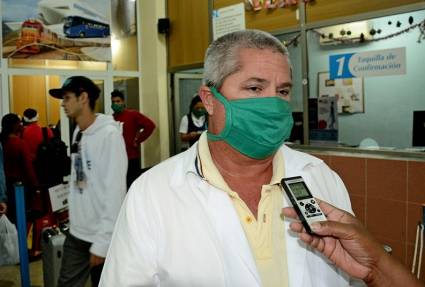
Our Duty is to Protect the People
Personal will and medical responsibility drives Alexander Labrada Torres every day to fiercely guard the border of Isla de la Juventud in the face of the COVID-19
By Roberto Díaz Martorell
March 23, 2020
Translated and edited by Walter Lippmann for CubaNews.

Dr. Alexander Labrada Torres is one of the many Cuban doctors protecting the borders to prevent the entry of the new coronavirus. Author: Roberto Díaz Martorell Published: 23/03/2020 | 08:55 pm
Nueva Gerona, Isla de la Juventud – The alarm clock sounds at 5:00 a.m. and Dr. Alexander Labrada Torres turns it off instinctively. His tired body resists getting out of bed, but the responsibility as a doctor gives him the final push and, as he did several weeks ago, he gets ready to do her duty.
At his side, his wife, Yuraika Gonzalez, diligently prepares breakfast and helps with the backpack. Nothing can be left behind: gloves, nasobuco (mask), cap, the water to drink, the glass…, and the kiss goodbye after the strong coffee to recharge the batteries. Alex goes out on his bike and travels the distance between his house and the Passenger Boarding Terminal in Isla de la Juventud, where he is the head of the border service dealing with COVID-19.
“Responsibility is inherent in every doctor and you comply with corresponding rigor, especially when it is your turn to look after the health of more than 500 people every dayl There are are two trips more than a thousand, in addition to the crew. In addition, each person conducts himself in a different way and sometimes it is very difficult to dialogue,” he says while organizing the work at the terminal.
First, he prepares with all the established attachments for cases like these, then he distributes the resources to the workers who, are obliged to interact with the people and watch over the fulfillment of the foreseen measures. It stops. He observes that everything is going well and he almost smiles.
“It is my responsibility to monitor every boat that leaves or arrives on the Isle of Youth; I do it together with the nurse on the catamaran to check the temperatures and the active search for any respiratory symptoms. The first trip begins with the check of bulletins from 5.30 a.m., and when we set sail, contact with the director of the entity along with the board of directors to assess the implementation of health and hygiene measures in all its units.
“And if it were only one trip, it would end with the reception of the boat around 3:00 or 4:00 p.m., but on Mondays, Wednesdays, and Fridays there are two,. On the second one, the control begins around 2:00 p.m. That second trip arrives in Nueva Gerona after midnight and sometimes until 4:00 a.m., and already at 5:30 a.m. a new day begins.
“I am very grateful to my wife; without her support, it would be very difficult to complete these schedules, I almost always arrive at the house to eat and sleep. I almost always arrive at the house to eat and sleep. While keeping myself informed of the hygienic and epidemiological situation of the country and the municipality,” he says, taking a seat to “refresh” the tiredness caused by the intensity of the work and sleeping after hours.
But Alex is not satisfied yet; he still thinks that a large part of the population does not understand the magnitude of the situation and maintains inadequate behavior. “The fact that, in Isla de la Juventud, there are still no confirmed cases of COVID-19 does not eliminate the conditions of vulnerability for contagion and that is avoidable if the measures of the Ministry of Public Health are fully complied with,” he explains.
“I get tired and I get better; fulfilling my medical responsibility is the daily vitamin I consume. We can’t afford not to identify a COVID suspect, because I know that with my work I’m protecting an entire island that expects the best from me,” he says.
At the Viajero maritime terminal in Nueva Gerona, no confirmed positive cases are reported, but they are on high alert. Any respiratory or feverish symptoms are monitored in those who leave or enter the territory by this route. “Here we have a post or isolation room, health hearings are held for passengers during their stay. Also, when they board the boat they disinfect their hands with sodium hypochlorite,” he explained.
During the trip to the port of Batabanó, the catamaran carries a nursing staff with the necessary medical supplies to act in case of an emergency and also during the three hours of travel is observed the conduct of passengers, if necessary to activate the protocol provided.
Alex tells us that the most critical day happened with the first Italian who arrived in the territory with catarrhal symptoms and he was on duty at the General Teaching Hospital Héroes del Baire. “Everything was very fast, with no time for training, and we didn’t have much knowledge of the disease. It was a long night without sleeping and I was worried, because I didn’t know what would happen in the morning. Luckily it was negative; the patient only had to be treated for pneumonia.
“I have been counting the days for two weeks in a row, but I have the confidence and assurance that my personal actions are helping to keep this little island free of the coronavirus. And I know that, like me, there are thousands in the country who keep a permanent watch on our borders; a hug for them and we continue to fight. Our duty is to protect people and we will do it,” he emphasized.

You must be logged in to post a comment.